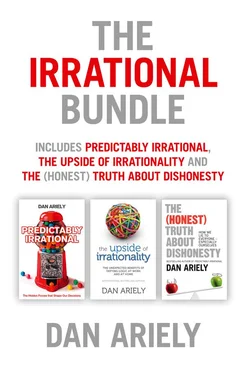Dan Ariely - The Irrational Bundle
Здесь есть возможность читать онлайн «Dan Ariely - The Irrational Bundle» — ознакомительный отрывок электронной книги совершенно бесплатно, а после прочтения отрывка купить полную версию. В некоторых случаях можно слушать аудио, скачать через торрент в формате fb2 и присутствует краткое содержание. Жанр: unrecognised, на английском языке. Описание произведения, (предисловие) а так же отзывы посетителей доступны на портале библиотеки ЛибКат.
- Название:The Irrational Bundle
- Автор:
- Жанр:
- Год:неизвестен
- ISBN:нет данных
- Рейтинг книги:3 / 5. Голосов: 1
-
Избранное:Добавить в избранное
- Отзывы:
-
Ваша оценка:
- 60
- 1
- 2
- 3
- 4
- 5
The Irrational Bundle: краткое содержание, описание и аннотация
Предлагаем к чтению аннотацию, описание, краткое содержание или предисловие (зависит от того, что написал сам автор книги «The Irrational Bundle»). Если вы не нашли необходимую информацию о книге — напишите в комментариях, мы постараемся отыскать её.
The Irrational Bundle — читать онлайн ознакомительный отрывок
Ниже представлен текст книги, разбитый по страницам. Система сохранения места последней прочитанной страницы, позволяет с удобством читать онлайн бесплатно книгу «The Irrational Bundle», без необходимости каждый раз заново искать на чём Вы остановились. Поставьте закладку, и сможете в любой момент перейти на страницу, на которой закончили чтение.
Интервал:
Закладка:
This experiment illustrates an unfortunate fact: when a social norm collides with a market norm, the social norm goes away for a long time. In other words, social relationships are not easy to reestablish. Once the bloom is off the rose—once a social norm is trumped by a market norm—it will rarely return.
THE FACT THAT we live in both the social world and the market world has many implications for our personal lives. From time to time, we all need someone to help us move something, or to watch our kids for a few hours, or to take in our mail when we’re out of town. What’s the best way to motivate our friends and neighbors to help us? Would cash do it—a gift, perhaps? How much? Or nothing at all? This social dance, as I’m sure you know, isn’t easy to figure out—especially when there’s a risk of pushing a relationship into the realm of a market exchange.
Here are some answers. Asking a friend to help move a large piece of furniture or a few boxes is fine. But asking a friend to help move a lot of boxes or furniture is not—especially if the friend is working side by side with movers who are getting paid for the same task. In this case, your friend might begin to feel that he’s being used. Similarly, asking your neighbor (who happens to be a lawyer) to bring in your mail while you’re on vacation is fine. But asking him to spend the same amount of time preparing a rental contract for you—free—is not.
THE DELICATE BALANCE between social and market norms is also evident in the business world. In the last few decades companies have tried to market themselves as social companions—that is, they’d like us to think that they and we are family, or at least are friends who live on the same cul-de-sac. “Like a good neighbor, State Farm is there” is one familiar slogan. Another is Home Depot’s gentle urging: “You can do it. We can help.”
Whoever started the movement to treat customers socially had a great idea. If customers and a company are family, then the company gets several benefits. Loyalty is paramount. Minor infractions—screwing up your bill and even imposing a modest hike in your insurance rates—are accommodated. Relationships of course have ups and downs, but overall they’re a pretty good thing.
But here’s what I find strange: although companies have poured billions of dollars into marketing and advertising to create social relationships—or at least an impression of social relationships—they don’t seem to understand the nature of a social relationship, and in particular its risks.
For example, what happens when a customer’s check bounces? If the relationship is based on market norms, the bank charges a fee, and the customer shakes it off. Business is business. While the fee is annoying, it’s nonetheless acceptable. In a social relationship, however, a hefty late fee—rather than a friendly call from the manager or an automatic fee waiver—is not only a relationship-killer; it’s a stab in the back. Consumers will take personal offense. They’ll leave the bank angry and spend hours complaining to their friends about this awful bank. After all, this was a relationship framed as a social exchange. No matter how many cookies, slogans, and tokens of friendship a bank provides, one violation of the social exchange means that the consumer is back to the market exchange. It can happen that quickly.
What’s the upshot? If you’re a company, my advice is to remember that you can’t have it both ways. You can’t treat your customers like family one moment and then treat them impersonally—or, even worse, as a nuisance or a competitor—a moment later when this becomes more convenient or profitable. This is not how social relationships work. If you want a social relationship, go for it, but remember that you have to maintain it under all circumstances.
On the other hand, if you think you may have to play tough from time to time—charging extra for additional services or rapping knuckles swiftly to keep the consumers in line—you might not want to waste money in the first place on making your company the fuzzy feel-good choice. In that case, stick to a simple value proposition: state what you give and what you expect in return. Since you’re not setting up any social norms or expectations, you also can’t violate any—after all, it’s just business.
COMPANIES HAVE ALSO tried to establish social norms with their employees. It wasn’t always this way. Years ago, the workforce of America was more of an industrial, market-driven exchange. Back then it was often a nine-to-five, time-clock kind of mentality. You put in your 40 hours and you got your paycheck on Friday. Since workers were paid by the hour, they knew exactly when they were working for the man, and when they weren’t. The factory whistle blew (or the corporate equivalent took place), and the transaction was finished. This was a clear market exchange, and it worked adequately for both sides.
Today companies see an advantage in creating a social exchange. After all, in today’s market we’re the makers of intangibles. Creativity counts more than industrial machines. The partition between work and leisure has likewise blurred. The people who run the workplace want us to think about work while we’re driving home and while we’re in the shower. They’ve given us laptops, cell phones, and BlackBerries to bridge the gap between the workplace and home.
Further blurring the nine-to-five workday is the trend in many companies to move away from hourly rates to monthly pay. In this 24/7 work environment social norms have a great advantage: they tend to make employees passionate, hardworking, flexible, and concerned. In a market where employees’ loyalty to their employers is often wilting, social norms are one of the best ways to make workers loyal, as well as motivated.
Open-source software shows the potential of social norms. In the case of Linux and other collaborative projects, you can post a problem about a bug on one of the bulletin boards and see how fast someone, or often many people, will react to your request and fix the software—using their own leisure time. Could you pay for this level of service? Most likely. But if you had to hire people of the same caliber they would cost you an arm and a leg. Rather, people in these communities are happy to give their time to society at large (for which they get the same social benefits we all get from helping a friend paint a room). What can we learn from this that is applicable to the business world? There are social rewards that strongly motivate behavior—and one of the least used in corporate life is the encouragement of social rewards and reputation.
IN TREATING THEIR EMPLOYEES—much as in treating their customers—companies must understand their implied long-term commitment. If employees promise to work harder to achieve an important deadline (even canceling family obligations for it), if they are asked to get on an airplane at a moment’s notice to attend a meeting, then they must get something similar in return—something like support when they are sick, or a chance to hold on to their jobs when the market threatens to take their jobs away.
Although some companies have been successful in creating social norms with their workers, the current obsession with short-term profits, outsourcing, and draconian cost cutting threatens to undermine it all. In a social exchange, after all, people believe that if something goes awry the other party will be there for them, to protect and help them. These beliefs are not spelled out in a contract, but they are general obligations to provide care and help in times of need.
Again, companies cannot have it both ways. In particular, I am worried that the recent cuts we see in employees’ benefits—child care, pensions, flextime, exercise rooms, the cafeteria, family picnics, etc.—are likely to come at the expense of the social exchange and thus affect workers’ productivity. I am particularly worried that cuts and changes in medical benefits are likely to transform much of the employer-employee social relationship to a market relationship.
Читать дальшеИнтервал:
Закладка:
Похожие книги на «The Irrational Bundle»
Представляем Вашему вниманию похожие книги на «The Irrational Bundle» списком для выбора. Мы отобрали схожую по названию и смыслу литературу в надежде предоставить читателям больше вариантов отыскать новые, интересные, ещё непрочитанные произведения.
Обсуждение, отзывы о книге «The Irrational Bundle» и просто собственные мнения читателей. Оставьте ваши комментарии, напишите, что Вы думаете о произведении, его смысле или главных героях. Укажите что конкретно понравилось, а что нет, и почему Вы так считаете.












